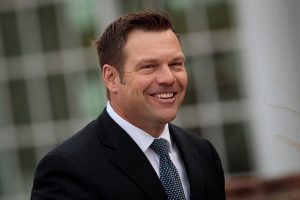
Kris Kobach (Photo by Drew Angerer/Getty Images)
With Kirstjen Nielsen out at the Department of Homeland Security, Kansas’s Kris Kobach is ready for his close-up. He’s flashing those pearly whites to Lou Dobbs, visiting his GoFundMe border wall project in New Mexico, and heading over to Breitbart to lay out a plan to solve the humanitarian border crisis in just Three Easy Steps:
- Overturn the Flores decision. What does that Judge Flores know anyway!
- Transport all the unused FEMA trailers to the border and set up a camp for detained migrants waiting to have their claims processed. You know, to concentrate them all in one place.
- Require proof of legal residence to send remittances to Mexico, then refuse to lift the ban until Mexico coughs up $5 billion for the border wall and agrees to house all Central American migrants for processing in their country.

The Law Firm’s Guide To Trust Accounting And Three-Way Reconciliation
Proper trust accounting and three-way reconciliation are essential for protecting client funds and avoiding serious compliance risks. In this guide, we break down these critical processes and show how legal-specific software can help your firm stay accurate, efficient, and audit-ready.
Or perhaps not. As retiring Kansas Senator Pat Roberts told the Kansas City Star, “Don’t go there. We can’t confirm him.” Because, despite his degrees from Harvard, Yale, and Oxford, it turns out that Kobach’s record as a lawyer is somewhat… mixed.
With a Capital T, That Rhymes With P, and that Stands for IMMIGRANTS!
Since 2006, Kobach has run a side business helping small towns craft ordinances to discourage undocumented immigrants settling there. Even while he was Kansas’s secretary of state, ProPublica and the Kansas City Star report, Kobach was paid tens of thousands of dollars per year to draft legislation forcing landlords and employees to verify citizenship. As Jeff Whitteaker, former mayor of Valley Park, MO, told the Riverfront Times in 2007:
You got one guy and his wife that settle down here, have a couple kids, and before long you have Cousin Puerto Rico and Taco Whoever moving in. They say it’s their cousins, but I don’t really think they’re all related. You see fifteen cars in front of one house — that’s pretty suspicious.
Except that Valley Park’s No Taco law was immediately challenged in court, where Kobach made the tactical decision to pare the ordinance down to a ban on “knowingly” hiring undocumented workers. Which is already illegal under federal law, but Kobach nonetheless termed it a “great victory” as he cashed the check for services rendered to the town of 7,000. Kobach’s success was replicated in small towns such as Hazleton, PA (Pop. 25,000), which required a state bailout when it incurred $1.4 million in legal fees, and Farmers Branch, TX (Pop. 37,000), which wound up spending $7 million. Not all the money went into Kobach’s pocket, but ProPublica estimates that he netted upwards of $800,000, of which at least $150,000 was paid while he was Kansas’s secretary of state.
The Fraudulent Vote Fraud Commission
After Trump won the White House by losing the popular vote, he dispatched Kris Kobach to find those three million “illegal voters” in California. This suited Kobach just fine, since it’s been his long-term goal to amend the National Voter Registration Act to mandate proof of citizenship for first-time voters. So Trump issued an executive order establishing a Presidential Advisory Commission on Electoral Integrity, and Kobach rounded up his buddy Hans von Spakovsky from the Heritage Foundation to find the millions of undocumented voters who were willing to risk arrest and deportation to do something more than half of us can’t even be bothered with anyway. And they would have gotten away with it, too, if it weren’t for those meddlesome Democrats they were forced to put on the Commission!
First, Kobach demanded that every state send the Commission the name, date of birth, address, voting history, and partial social security number for every registered voter. Disclosing this data violated the laws of several states, including Kansas, so Secretary of State Kris Kobach was regretfully forced to tell Lord High Vote Commissioner Kris Kobach to take a hike, at least as far as social security numbers were concerned.
But many states did send in their voter data, which Kobach helpfully parked on a shared database. He then sent the password to that database of 98 million voters to all 32 participating secretaries of state via unencrypted email. But to save hackers the trouble, Florida just released the email in response to a FOIA request.
HUGE point from today – Crosscheck subjects voter records to FOIA requests in other states. FL gave out KS records WITH SSN4! @illinoissbe pic.twitter.com/fObNWYP2zD
— Indivisible Chicago Northwest Side (@indivchicagonw) October 17, 2017
Which is how Kobach’s vote fraud commission wound up getting sued for violating federal privacy and data protection laws. Then Maine Secretary of State Matthew Dunlap, one of those pesky Democrats shoehorned into the group, sued Kobach for failing to include him on emails or even include him in meetings. And just as Kobach was on the cusp of discovering evidence of the millions of illegal voters who swung the popular vote against Trump, the president shut the Commission down. SAD.
Fool for a Client Gets Held in Contempt
Lest we forget, during all of the above, Kobach still hung onto his day job as Kansas’s Secretary of State. And in this capacity, he decided he’d save the taxpayers a bunch of money by defending Kansas’s voter ID law in court himself. Time to prove once and for all that the Sunflower State was awash in illegal voters!
Only it turned out that Kobach hadn’t actually learned much about how to run a trial when he was out defending those No Taco laws in the hinterlands. Who knew judges could be such sticklers about making sure an expert witness is “qualified” and submitting evidence to opposing counsel before entering it into the record, right? ProPublica reports:
Kobach’s cross examinations were smoother and better organized, but he regularly attempted to introduce exhibits — for example, updated state statistics that he had failed to provide the ACLU in advance to vet — that [federal Judge Julie] Robinson ruled were inadmissible. As the trial wore on, she became increasingly irritated. She implored Kobach to “please read” the rules on which she based her rulings, saying his team had repeated these errors “ad nauseum.”
Kobach seemed unruffled. Instead of heeding her advice, he’d proffer the evidence for the record, a practice that allows the evidence to be preserved for appeal even if the trial judge refuses to admit it. Over the course of the trial, Kobach and his team would do this nearly a dozen times.
Eventually, Robinson got fed up. She asked Kobach to justify his use of proffers. Kobach, seemingly alarmed, grabbed a copy of the Federal Rules of Civil Procedure — to which he had attached a growing number of Post-it notes — and quickly flipped through it, trying to find the relevant rule.
The judge tried to help. “It’s Rule 26, of course, that’s been the basis for my rulings,” she told Kobach. “I think it would be helpful if you would just articulate under what provision of Rule 26 you think this is permissible.” Kobach seemed to play for time, asking clarifying questions rather than articulating a rationale. Finally, the judge offered mercy: a 15-minute break. Kobach’s team rushed from the courtroom.
Kobach not only lost his case, but Judge Robinson held him in contempt for ignoring a court order to inform voters of their eligibility, forced him to pay the costs of a sanctions motion filed by the ACLU, and ordered him to take six hours of CLE. Truly, the man is a credit to the profession.
Undaunted, Kobach threw himself back into politics, where he managed to lose the 2018 gubernatorial election to a Democrat. In Kansas.
Which is a long way of saying, perhaps Senator Roberts is right about Mr. Kobach’s prospects of Senate confirmation to head the Department of Homeland Security. On the other hand, if reports that Neilsen was fired for refusing to violate the law are correct, he may be just the man for the job!
Kris Kobach’s Lucrative Trail of Courtroom Defeats [ProPublica]
Valley Park to Mexican immigrants: “Adios, illegals!” [Riverfront Times]
How the Case for Voter Fraud Was Tested — and Utterly Failed [ProPublica]
Judge strikes down Kansas voter ID law and orders Kris Kobach to take additional CLE [ABA Journal]
Elizabeth Dye lives in Baltimore where she writes about law and politics.
